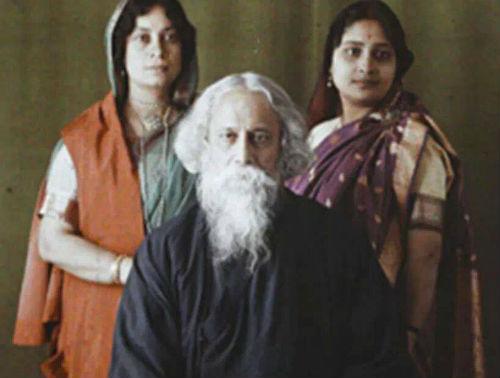 nil
nil
West Bengal celebrates Rabindra Jayanti
Kolkata, May 9 (IBNS): West Bengal, along with the rest of India, dedicated Friday to mellifluous songs, captivating poems and stirring plays as the Bengali community across the country celebrated the birth anniversary of world poet and Nobel laureate Rabindranath Tagore.
On Tagore's 153rd birthday, Indian President Pranab Mukherjee said:"On the occasion of the birthday of Gurudev Rabindranath Tagore, I join fellow citizens in paying tribute to this great nationalist and thinker who was far ahead of his times."
"Tagore was a renaissance personality. Such souls not only illuminate the times they live in, but also remain an inspiration for humanity," Mukherjee said in his message.
"A revered poet, writer, painter, author of our National Anthem, and Asia’s first Nobel laureate in the field of literature, Tagore was a global citizen who believed that one could promote one’s own culture while appreciating the culture of others. He did not see any contradiction between respect for universal values, while maintaining one’s own," he said.
"The significance of Gurudev Rabindranath Tagore’s philosophy of harmony, peace, love and good-will and his vision of “ONE WORLD” remain relevant today – despite the passage of time. One of the most outstanding creative geniuses of modern India, Tagore’s legacy will always endure," his message read.
West Bengal Chief Minister Mamata Banerjee also paid her tribute to the bard by posting a poem on her Facebook page dedicated to Tagore.
With Bengal observing a state holiday on the bard's birth anniversary, the community makes the most of it to observe his birthday and pay tribute, which is generally known as 'Rabindra Jayanti' celebrations here.
His birthday is celebrated on May 8 or 9 after Visva-Bharati University, established by him in Bolpur town (Santiniketan) ofWest Bengal, decided to celebrate the birth anniversary of Gurudev Rabindranath Tagore on the actual date of his birth, Boishakh 25, scrapping a rule ushered in by his predecessor - that of celebrating the bard's birth anniversary on Poila Boishakh.
His birthday is celebrated in a grandeur manner at his ancestral home Jorasanko Thakur Bari in Kolkata, where several cultural programmes are organised. The celebrations here start at morning and continue for the rest of the day.
Students as well as popular artists are witnessed celebrating the day in Jorasanko Thakur Bari every year by dancing to the tunes of Tagore's composition, singing his songs and reciting his poems.
In almost every locality, cultural events are organised to commemorate his birthday by rejoicing the bard's songs, poems, plays and dances.
A very popular tradition is to hold a procession early in the morning, where women clad in sarees and men in dhoti kurtas, sings Tagore's songs and performs skits on road.
Celebrations commences a day before his birthday, as students in schools and colleges, dress themselves up in traditional sarees and kurtas and participate in 'Rabindra Jayanti' celebration.
Tagore was a Bengali polymath who reshaped his region's literature and music. He authored the Gitanjali and its "profoundly sensitive, fresh and beautiful verses".
Tagore became the first non-European to win the Nobel Prize in Literature in 1913.
He modernised Bengali art by spurning rigid classical forms and resisting linguistic strictures.
His novels, stories, songs, dance-dramas, and essays dealt in topics ranging from political and personal.
Gitanjali (Song Offerings), Gora (Fair-Faced), and Ghare-Baire (The Home and the World) are some of his best-known works, and his verse, short stories, and novels were acclaimed for their lyricism, colloquialism, naturalism, and unnatural contemplation.
His compositions were chosen by two nations as national anthems: India's 'Jana Gana Mana' and Bangladesh's 'Amar Shonar Bangla'.
Top Headlines
-
News
Sheikh Hasina attacks Muhammad Yunus from first public address in Delhi, urges uprising in Bangladesh
January 23, 2026
-
News
Top Maoist leader with 2 crore bounty among 16 eliminated in major Jharkhand encounter
January 23, 2026
-
News
Russia, US, Ukraine to hold first trilateral talks in UAE, Zelensky announces
January 22, 2026
-
News
Supreme Court slams Maneka Gandhi over remarks on stray dogs case, flags possible contempt
January 20, 2026
-
News
'India-EU trade deal nears finish line': European Commission Prez at Davos, calls it mother of all deals
January 20, 2026
-
News
Nitin Nabin becomes BJPs youngest president ahead of key assembly polls, PM Modi calls him my boss
January 20, 2026
-
News
PM Modi calls Nitin Nabin my boss as he takes over BJP leadership
January 20, 2026
-
News
David Beckhams son drops bombshell, accuses parents of trying to ruin his marriage
January 20, 2026
-
News
Mamata Banerjee appeals to CJI for protection from targeting by agencies amid ED row
January 18, 2026
-
News
Trump tariff bomb on Iran trade: Tharoor flags existential crisis for Indian exporters
January 15, 2026





